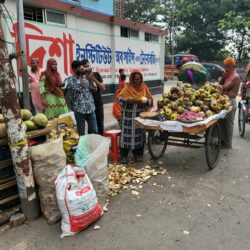A Cinematic Approach to Tackling Antimicrobial Resistance
Written by Amiyo Rahman, Edited by Nichola Jones
Last summer, as part of the implementation stages of the COSTAR project, members of the ARK Foundation and University of Leeds teams conducted Participatory Video (PV) workshops in the Mirpur area of Dhaka, Bangladesh. The teams spent a week conducting intensive PV workshops with community members; sharing knowledge on AMR, learning about video-making and filming the local area. Amiyo Rahman, the videographer for the ARK Foundation, reflects here on that process.

The urban site in Bangladesh where the Participatory Video intervention took place
In the heart of diverse communities, a powerful initiative has taken root, bringing together individuals from various backgrounds to address a global health concern: antimicrobial resistance. This captivating journey into the world of filmmaking not only equipped participants with the technical skills to create films but also empowered them to overcome personal barriers, fostering a newfound enthusiasm for making a positive impact on society.
At the onset of the training, participants faced a common fear—speaking in front of the camera. The journey from trepidation to confidence was a testament to the transformative power of filmmaking. The immersive training sessions not only honed their technical skills but also provided a safe space to express their thoughts, turning fear into a source of empowerment. So, filming self-introductions not only served as an innovative icebreaker but also became a skill-building exercise.

Urban food sellers in Bangladesh
The participants, hailing from diverse backgrounds, became adept storytellers through the lens of a camera. The training cultivated a shared understanding of the critical issue of antimicrobial resistance, transcending individual differences and uniting them in a common cause. Their films became powerful tools to educate, raise awareness, and inspire change within their communities. Throughout the training, theory seamlessly intertwined with practice. Participants implemented their daily learnings in practical scenarios, capturing the essence of the training in real-world filmmaking situations. This hands-on approach not only reinforced their technical skills but also instilled a sense of confidence and mastery over the filmmaking process.

Participants get to grips with filming... on the move!
As the participants' technical skills reached new heights, the focus shifted to the heart of filmmaking—the script. Guided by the training team, participants explored the nuances of storytelling, developing narratives that would serve as powerful vehicles for addressing antimicrobial resistance. The training room transformed into a collaborative space, where ideas flowed, and scripts came to life.
The resulting documentaries are more than just visual narratives—they are catalysts for change. Through storytelling, these community filmmakers have successfully conveyed the urgency of addressing antimicrobial resistance. The emotional depth and authenticity captured on film resonate with audiences, making the issue tangible and relatable. What began as a training program evolved into a community of enthusiastic individuals committed to continued learning and action. The participants' eagerness to delve deeper into filmmaking even after the sessions ended speaks volumes about the program's impact. They now see themselves not just as filmmakers but as advocates for health and change.
The ripple effect of this participatory video project extends beyond the screen. Communities are engaging in discussions, healthcare practices are evolving, and individuals are becoming proactive in addressing antimicrobial resistance. The films have become a rallying point for collective action, highlighting the potential of community-driven initiatives in addressing global health challenges.
The fusion of filmmaking and community engagement has proven to be a potent force in addressing antimicrobial resistance. Through overcoming personal fears, acquiring new skills, and harnessing the power of storytelling, these community filmmakers have become champions of change. As their stories continue to resonate, it becomes clear that the art of filmmaking can serve as a transformative tool in the hands of communities, inspiring a collective movement towards a healthier, more resilient future.

All participants receive a certificate and celebrate the film-making skills they have developed over the course of the intervention
With thanks to Amiyo for his reflections, and congratulations to the participants who made excelent films on local issues that relate to AMR. Below is a picture of the cohort receiving their certificates of completion.
All pictures taken during the PV workshop period by ARK Foundation and University of Leeds staff.
